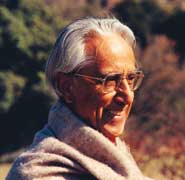



New Delhi 2013
Remembering Raimundo Panikkar – Pilgrim Across Worlds
Asia Project. November 30 – December 1, 2013.
Collaboration: Instituto Cervantes, Kapur Surya Foundation and India International Centre
This Seminar gathered eminent scholars from India and abroad to explore various perspectives from the trailblazing oeuvre of the late Raimundo Panikkar (1918-2010).
Dr. Karan Singh opened the seminar by evoking Panikkar’s dual heritage through his Hindu father and his Spanish Catholic mother, and the four places with which he is primarily associated: the Kerala of his ancestors, Barcelona where he was born, Varanasi where he lived, studied and wrote for many years, and California where he taught and won global fame. Ramon Blecua, Spain’s Deputy Chief of Mission, spoke of Panikkar as one of the rare ‘windows’ to eastern wisdom in Spain during the Franco era, and a masterly exponent of Vedic lore, though he did not abandon his Catholic faith. He pointed out that this unique mystical scholar embodied one of India’s essential contributions to global thought, i.e. its non-dogmatic character. Dr. Kapila Vatsyayan, who chaired the opening session, brought out some aspects of Panikkar’s distinction between sacred cyclical time and secular human time.
The participants dealt with many of the facets of Panikkar’s complex and far-reaching works that are now being gathered in the 18 volume Opera Omnia published under the supervision of his intellectual trustee Milena Carrara and his Vivarium foundation. Bettina Baumer spoke of Panikkar’s critique of modernity as a transient western fashion manifest in the present form of globalistion, generally destructive of tradition and diversity, as opposed to the natural forms of modernity, endogenous to each culture. Anand Amaldass dwelt on a connecting thread in all his work which is the quest for rtattva: the rhythm of Being as the ‘sesame’ to ‘Hindu-Christian theology’ through cross-fertilisation of the Christic faith with eastern understanding.
Joseph Prabhu emphasised Panikkar’s seminal contribution to the concepts and practices of interreligious dialogue as a method to evolve a philosophy of peace. Maciej Bielawski focused on his biography as a key to understanding the evolution of his polyfacetic, plurilingual thinking, while Grevel Lindop poetically portrayed his joyous, child-like monastic innocence, strong social and humanitarian concerns, as well as his rare but valuable works of literary fiction.
While Shiv Talwar drew parallels with the emerging vision of the Ultimate Mystery deriving from advances in mathematics and the physical sciences, Jorge Gispert qualified Panikkar as a ‘missionary of the future’ who led the way in a global transition from ‘cultures dominated by ethnic rivalries to a world that recognises equality in human dignity and solidarity’. He emphasised his definition of samanvaya as immanence of one being or creed into the other so that they remain separate despite being aware of their essential connection. In that perspective relation is truth (logos). Panikkar calls this ‘radical relativity’ which embraces but transcends and corrects both monism and dualism. The venerable Samdhong Rimpoche recalled his many dialogues with him on aspects of Buddhist dialectics, epistemology and hermeneutics to which Panikkar uncovered parallels in Christian theology while grasping the unbreakable continuity between Hindu and Buddhist metaphysics and civilisations.
Come Carpentier analysed Panikkar’s approach to history, religion and man in the perspective of the Perennial Philosophy school reflected in the writings of Rene Guenon, Ananda Coomaraswamy, Julius Evola and Aldous Huxley among others.
Throughout, there was a lively and wide-ranging discussion of both the theoretical aspects and the practical dimensions of Panikkar’s conceptual legacy. Various ideas were tabled to help spread and popularise his critically important contribution at a time when fundamental rethinking is taking place in many parts of the world, and in the Vatican notably, about the course being followed by mankind and the need for radical change on the lines he traced.
Come Carpentier de Gourdon
el sitio oficial